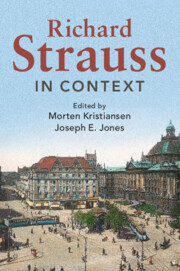Book contents
- Richard Strauss in Context
- Composers in Context
- Richard Strauss in Context
- Copyright page
- Contents
- Figures
- Notes on Contributors
- Preface
- Note on Translation
- Part I Family, Friends, and Collaborators
- Part II Career Stations
- Part III Cultural Engagement and Musical Life
- Chapter 14 Strauss as Reader
- Chapter 15 Antiquity
- Chapter 16 Philosophy and Religion
- Chapter 17 The Allgemeine Deutsche Musikverein
- Chapter 18 The Genossenschaft Deutscher Tonsetzer
- Part IV Professional and Musical Contexts
- Part V In History
- Part VI Artifacts and Legacy
- Further Reading
- Appendix: Letters Bibliography
- Index
Chapter 18 - The Genossenschaft Deutscher Tonsetzer
from Part III - Cultural Engagement and Musical Life
Published online by Cambridge University Press: 08 October 2020
- Richard Strauss in Context
- Composers in Context
- Richard Strauss in Context
- Copyright page
- Contents
- Figures
- Notes on Contributors
- Preface
- Note on Translation
- Part I Family, Friends, and Collaborators
- Part II Career Stations
- Part III Cultural Engagement and Musical Life
- Chapter 14 Strauss as Reader
- Chapter 15 Antiquity
- Chapter 16 Philosophy and Religion
- Chapter 17 The Allgemeine Deutsche Musikverein
- Chapter 18 The Genossenschaft Deutscher Tonsetzer
- Part IV Professional and Musical Contexts
- Part V In History
- Part VI Artifacts and Legacy
- Further Reading
- Appendix: Letters Bibliography
- Index
Summary
The Genossenschaft Deutscher Tonsetzer (GDT: Association of German Composers) was founded on January 14, 1903 and became the first successful collective management organization in Germany. Its establishment followed two failed attempts to establish an institution for musical performing rights and is best understood through consideration of those prior attempts, which, though unsuccessful, set the stage for the founding of the GDT. This chapter also considers the role of Richard Strauss and his friends Friedrich Rösch and Hans Sommer in addition to that of the German music dealers in this royalty movement. Finally, it also discusses the reciprocal effects of the reform of the German Copyright Act and the movement.
Keywords
- Type
- Chapter
- Information
- Richard Strauss in Context , pp. 162 - 170Publisher: Cambridge University PressPrint publication year: 2020

